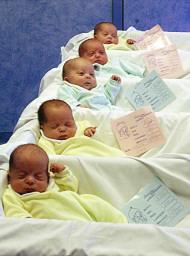Contrary to what their mothers might think, Italian kids need to be a bit dirtier, according to paediatricians attending a recent conference on allergies.
Three in ten Italian children these days suffer from one allergy or another and the problem, experts say, is that they're living in a super-hygienic bubble carefully created for them by adults.
''Natural contact with microbes and bacteria serves to strengthen children's immune defences. Excessive hygiene is negative,'' said Alberto Ugazio, head of the paediatrics department at Rome's Bambino Gesu' hospital.
In the 1950s only 10% of Italian children had allergies, Ugazio pointed out, adding that in Africa they were negligible precisely because of the ''greater exposure to microbes''.
He said mums and dads who zealously bathed their tots every day were probably not helping, given that twice a week was the best frequency for baths.
The bacteria-free world being created for children is removing the stimuli that kids' bodies need to develop a healthy capacity for resistance, conference participants agreed.
They admitted that pollution, one of the frequently cited causes of allergies, was a factor but said it was very rarely the primary cause.
The Rome convention on allergies also provided an opportunity for paediatricians to take a swipe at a few allergy-related bugbears. These included parents who refuse to vaccinate children with allergies, fearing they will make the situation worse.
The latest figures showed that only 6% of children with allergies were receiving all the vaccinations they should.
Paediatricians said that allergic children were in fact even more in need of preventive shots because of the complications that could set in if they caught influenza, for example.
Short shrift was also given to some parents' argument that their asthmatic sons and daughters could not do sport. As long as the pathology was being treated and under control, it was quite safe to play football or basketball, doctors said. Apart from the dearth of germs, there was also a feeling among paediatricians that the steady increase in allergies was connected to a growing desire among the population to obsess about food and slap the 'allergy' label on any number of minor complaints.
Allergies are, it was said, in danger of becoming a fashionable obsession and the tendency is possibly helped along by companies willing to pander to this new need.
''How else can you explain the fact that in Italy the market for artificial or special milk is twice as big as in many other countries?'' said Ugazio. ''In reality only 2.5% of babies are allergic to cow's milk but certain surveys put the figure at 15%''.













